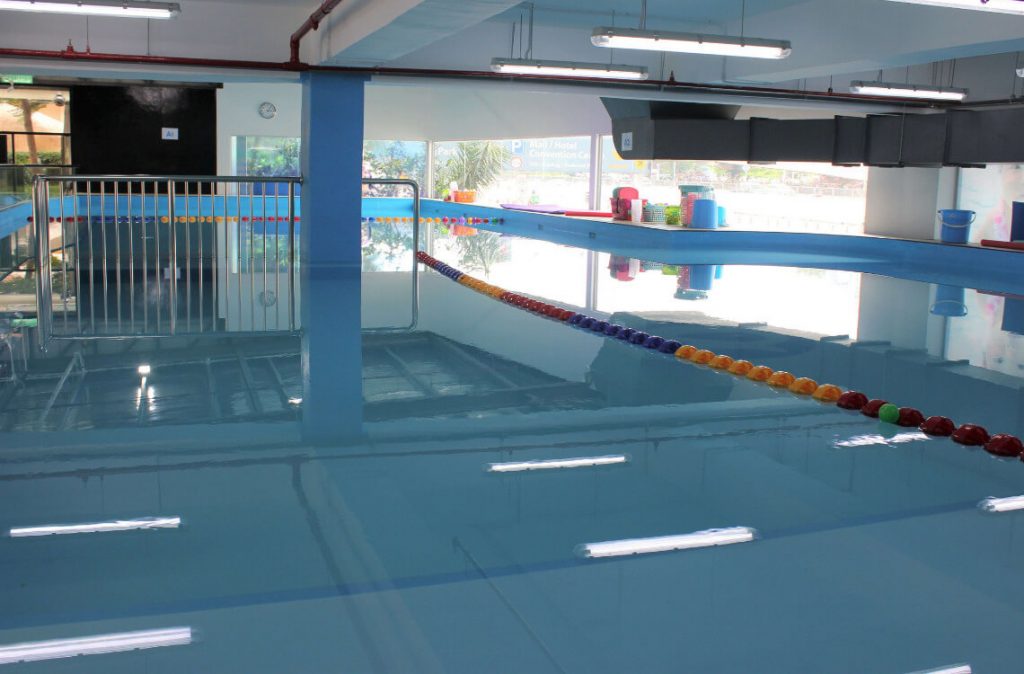How does swimming at a young age enhance children’s physical and mental health?
Is our water environment safe for our children to learn swimming?
Swimming has always been one of the most-loved activities for everyone, especially in Malaysia where the weather is hot and humid all year round, and Malaysia itself is surrounded by beautiful beaches and swimming pools. Not to have the young ones missing out, swimming lesson for children and even infants are gaining popularity so that they do not develop a fear of water from young and enjoy swimming safely with their friends and family. However, there are still a number of parents who balk at the idea of exposing their little ones to the chemical substances and chilly water in pools and, most importantly, safety. Especially with the current pandemic, most parents are still concerned that it may not be safe for children to even get involved in any water-related activities. However, as sanitisation now plays a very vital role in a children’s safety and health in any area that they may be exposed to, most swimming schools and centres such as The Happy Fish Swim School would not only ensure the sanitisation of the swimming pool, but also to ascertain that the water pool level adheres to the guidelines set by the government.
Here’s why starting swimming from young can be a sustainable skill to kids:
1. Swimming at early age helps them to cope with fear of water and also a gentle exercise to their body
The most significant advantage of children learning to swim at a young age compared to when they are older is to prevent them from having the fear of water. Comfort is the very first developmental component of swimming. Children will be taught the proper form and breathing techniques that instil confidence in them while they swim. While most young children do not naturally fear water, they will be able to adapt to the water environment more easily and progress further instead of growing with a fear that may worsen as they age. The earlier that children start swimming, the shorter the transition period for them to get comfortable in the water and thus, less difficult to progress.
2. Swimming brings health benefits and improves coordination
Swimming is great for cardiovascular health. Cardiovascular is the circulatory system to supply blood to the entire body. Through swimming, children’s bodies will be trained to use oxygen more efficiently which further helps strengthen the heart, blood vessels, brain and lungs. Swimming is suitable for children suffering from asthma too, for when children are holding their breath in water, the action not only helps to expand their lung capacity, but also gains a greater ability to control their breathing.
Other than that, when children are required to move their arms and legs together during swimming, they are working out their muscles for stronger strength and control, which will also contribute to the improvement of body coordination and balance. It is not an easy task for your little ones to put their body movement together. As they practice more, they will strive in other activities in their daily life, be it running, jumping, writing and more!
3. Swimming improves cognitive functioning
When swimming, children move their arms and kick their legs at the same time, promoting bilateral cross-patterning movements. The movement of using the opposite arm and leg will help children’s brain growth by building neurons especially in the corpus callosum, which acts as a connector to transfer complex information between two halves of the brain. Hence, swimming will help facilitate children’s communication and digestion of information and, in the long run, enable them to better cope with academics in terms of reading skills, language development and also spatial awareness. Most commonly, corpus callosum will have finished developing at the age of 12, so why not take this opportunity to boost your little one’s brain development earlier?
Brain connectivity is also vital for better hand-eye coordination. The brain is responsible for exchanging signals for coordinating the eyes and hands to ensure they are fixed on the same target. Exercises such as swimming can increase brain volume and further improve this skill.
4. Boost self-esteem and social confidence
Swimming is a great way to socialise. As attending swimming classes is usually accompanied by other children, instructors and parents or caregivers, children are able to interact with people out of their comfort zone and therefore learn to function in groups. By making new friends and learning together, the positive social interactions and fun learning environment will help to improve children’s socialisation skills and also boost their self-esteem—enabling them to be more comfortable in talking and meeting new people. Just like other exercises, swimming can also help children to release anxiety and negative feelings, thus improving their emotional health.
Not only does swimming bring lifelong benefits to children and imbue in them an essential life skill, but also teaches them about water safety and the importance of sanitisation. Knowledge about water safety is important for children to learn the safety measures that they need to know when in water to avoid them from placing themselves in danger and remain calm during unwanted situations. Hence, with all adequate safety measures and pool water guidelines in place, there is no fear to get your child to be in the swimming pool and encourage them to start swimming at a young age to better progress the exercise—appreciating the benefits it brings them in later years.
Although we are still in the MCO stage, it is not too late to start planning to incorporate swimming into your little ones’ daily routine when MCO is over, and it could even be one of the family activities to jump into post-MCO for a meaningful parents-child bonding experience (and a healthier lifestyle)!
Read more interesting stories and fun recipes on Motherhood.com.my!
